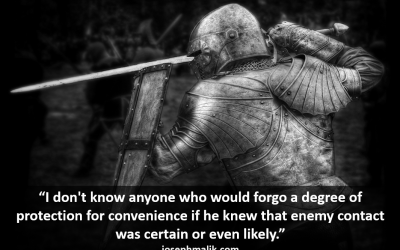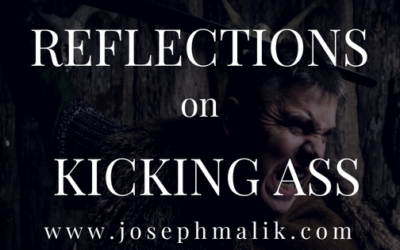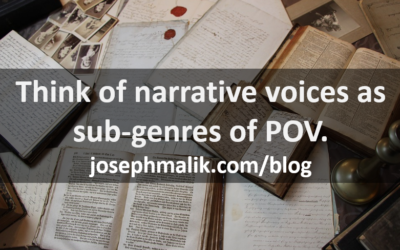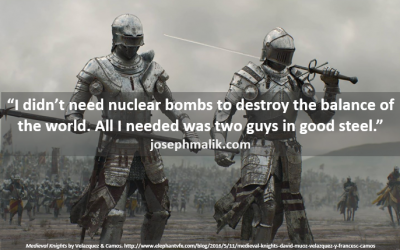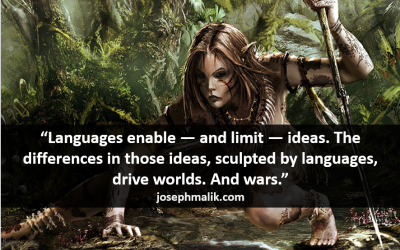Interview with author Joseph Malik
This was originally posted as an interview on Freda Hansburg’s blog on 14 October 2016.
10/14/2016
Tell us about your genre. How did you come to choose it? Why does it appeal to you?
I write fantasy. But . . . well, yeah. I write crossworlds, heavily researched epic fantasy political thrillers. Hard fantasy, is what some reviewers are calling it. I took a different tack on it, I guess. I don’t know that I chose it; it just seemed that nobody had done this before. My professional background is in Special Operations and strategic intelligence, and working this knowledge base into a fantasy story seemed to make sense to me at the time.Funny story, actually: I had put Dragon’s Trail down, completely forgotten about it for about five years. I was injured on a deployment in the military and found the story on an old hard drive when I was in the hospital Stateside. I had nothing to do, so I started working on it again. By then, I’d done some pretty intense work in nation-building and strategic-level intelligence, and I was able to tear the story apart and rebuild it using what I’d learned.I guess that this series is to my experience in intelligence and Special Operations what The Lord of the Rings was to Tolkien as a linguist: a sandbox to work out some theoretical constructs and to voice my professional observations. The series looks at the impacts of various levels of conflict, from slow-burn intractability (Book I) through global war (Books IV and V, eventually), on a fantasy society, and how superweapons – the characters from Earth, in this case – can escalate conflicts. When I finalized my fantasy world and got all the moving parts in place, and then looked at it from a professional perspective, the espionage plot just kind of wrote itself. All I had to do was have my protagonist stumble backwards into the middle of it. I enjoy reading thrillers, and the pacing and plotting came effortlessly once I knew what the story really was.
What do you find most challenging about the writing process, and how do you deal with it?
I’ve got about 75,000 words done on Book II; from a pure, word-count standpoint, I’m 75% done. But realistically, I’m about 20% finished. I believe that novels aren’t made of words. I believe that novels are made of plot, conflict, backstory, descriptions, motivations, chemistry, voice, pacing, dialogue, character development, story arc, worldbuilding (in fantasy), the Hero’s Journey (if you’re into that whole thing), allegory, research, romantic tension, polemic, metaphor, imagery. The words just hold all this stuff together in the shape of a novel. So, right now, it’s a matter of wedging all the rest of that stuff into the book and using the words to hold it all there. That takes time. The most challenging part is resisting the urge to type another 20,000 words and add THE END and then send it to my editor next week.
When and where do you do your writing?
Our house is a renovated barn. I have a den at one end of the house that’s set up as my office: bookshelves, my desk, my Wall of Freedom with my military awards and deployment photos, and a Book Wall full of maps and sketches. I generally write after work, but I’ve been laid off for a few months due to the budget fiasco. So for the next few months I’m really buckling down and writing. I hope to be back to work in January.
What have you learned about promoting your books?
Well, I’ve come to understand that there’s Writing to Market™, and there’s writing to market. This interview just got much longer with this question, but you hit on something here that I just figured out about a week ago.
I write hard fantasy, and I subscribe to the Method Acting school of writing. I go out and do a lot of this stuff myself. Like, as much as I can. Call it “Method Writing.”
I literally thought, until a few months ago when I stumbled across message boards specifically aimed at indie authors telling me otherwise, that being a fantasy writer was supposed to involve a lifetime of experiences and research aimed at building a fully-functional world: studying Liechtenauer, visiting forges, working out orbital mechanics and political systems, making friends with swordsmiths and fencing experts, going horse-camping, skulking about at RenFaire, studying philosophy and literature, greatsword fencing in your backyard to the concern of the neighbors, building conlangs. To me, that’s writing. All of it. And I’ve been doing this all my life. 25 of the past 30 years devoted to research and worldbuilding, at least part-time as a hobby if not choosing an educational or career field that feeds the monster directly. Really, 30 years, because five of those when I wasn’t writing I was still learning and experiencing stuff that I worked into this final version and that I’m carrying forward into the series. It’s all fuel.
I believe that only with the real-world aspects correct will a reader suspend disbelief sufficiently to allow you to introduce the fantasy aspects of your story.
I just recently realized that some – maybe many – fantasy authors don’t believe this, and don’t write this way; they don’t write for suspension of disbelief. And some of them get really upset when you ask them why they don’t. They grumble something about word counts and snarl at you.
I’ve been attending fantasy conventions for the past few years, not as an author – not even as a prospective author – but invited to speak as an expert on military strategy and the realities of combat. And in panel after panel, year after year, when we show a room packed with fantasy fans how things really work, dozens of hands go up asking why nobody ever writes this stuff. And my first reaction is always, “Really? Everybody gets that wrong? All my writer friends know this.” And then I go back through and look at what they’re talking about, and realize that fewer and fewer authors seem to be doing it this way. At least, fewer and fewer well-known ones.
(I should have clarified this, so I’m adding the following eight words:) With indies and small presses, it’s almost understandable. The amount of research and worldbuilding that the hard fantasy genre mandates makes it impossible to keep up with the kind of schedule that we’re told indie publishing requires. I’ve been told, verbatim, that it’s not possible to succeed as an indie author if I keep researching like I always have; I was told this not a week ago. I intend on proving that wrong, but it’s not going to happen before my “30-day cliff.” Apparently, during these first 30 days, I’m supposed to research and write a second book. And yeah, that’ll happen. I’ll get right on that. It took a week to design a functional pegasus saddle.
So, the thing I learned about promotion is that there’s promotion and promotion. I think for a book like Dragon’s Trail and the series to follow, it’s going to come down to the targeting, and that’s going to be tricky. I don’t know if massive promotion is really going to help. It couldn’t hurt, I’m sure, but there’s an ROI to consider.
I think (hope?) that what’s going to make this series take off is going to be next spring when I get back onto the convention circuit, speaking as an expert with first-hand experience. I’ll be at NorWesCon over Easter weekend, and I’m looking at several other cons across the West Coast later in the year. Again, not writing conventions; fantasy conventions. So I think my best bet right now is to put my next big whonk of promotional money into a print run in preparation for that. I intend on having a few copies handy every time I’m up there with a longsword and a laser pointer, so I can literally toss books out to readers who gripe that everybody gets it wrong. “Here. Tell your friends.”
Between now and then, I’ll be hitting up gaming shops on RPG nights, shaking hands, sitting in on a game or two, and handing out hardcopies and bookmarks with QR codes.
Because there are two possibilities. Either nobody’s doing “Method Writing” in fantasy anymore, in which case I’m out here alone with my crosshairs on a small and criminally overlooked readership asking for exactly what I’ve been writing; or, many writers are doing this, but they’re getting buried under prolific fantasy writers who eschew research for output, in which case I have a shot at opening the floodgates and blowing up a small and overlooked readership.
I do believe it’s likely the second case. I have writer friends who are just as crazy as I am. Michael “Tinker” Pearce, co-author of the wonderful Diaries of a Dwarven Rifleman and author of The Medieval Sword in the Modern World, has been my sparring partner for the past two, almost three decades. He’s also one of the greatest living swordsmiths and an instructor of stage combat and swordplay, and has literally forgotten more about metallurgy and swordsmanship than I have learned in all the years I’ve been researching. There are many other indie authors out there like Tinker who have the bona fides and write solid books. There have to be. It’s just getting them out in front of the right crowds, I think. I want to figure out how to do that so that I can take them with me.
Until then, though, this is all just words. I hope to make friends of some readers outside the hard fantasy genre between now and then, but there’s a small, yet faithful, readership for what I – and a few others – are doing. If Dragon’s Trail has a broader appeal, then great.
What are you most proud of as a writer?
Really, nothing, yet. Ask me again when I’ve accomplished something.
If you could have dinner with any writer, living or dead, who would it be and what would you talk about?
My grandmother, who was a Shakespeare scholar. I like to think she’d be proud of me right now.

